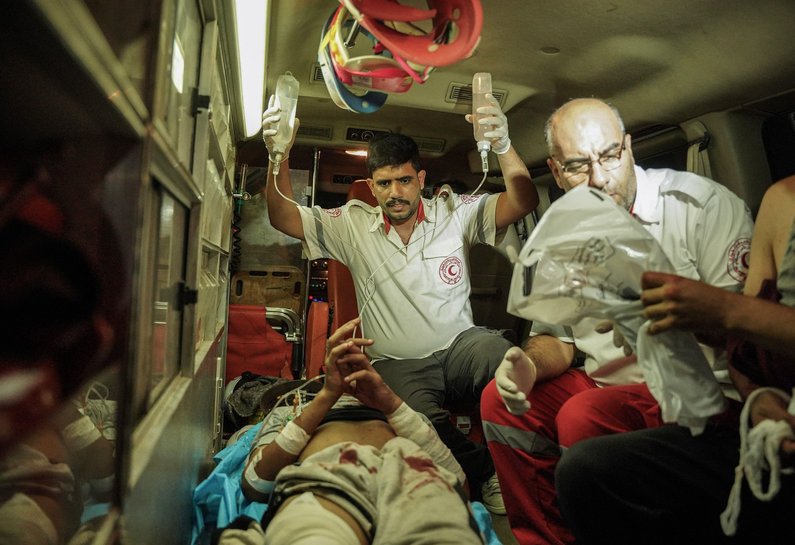No respite for exhausted Gaza healthcare workers after 300 days of Israel’s military assault

Since October, 1.9 million Palestinians in Gaza – 90% of the population – have been driven from their homes by the Israeli military. More than 1.7 million Palestinians have been forcibly evacuated into an area of land only 48km2, meaning there are now more than 35,000 people per km2, five times the population density of London.
People are crammed into areas coming under constant attack, including so-called ‘safe-zones’. The Israeli military has systematically dismantled healthcare services which has exacerbated a public health catastrophe, with 1.8 million cases of communicable diseases recorded and a severe risk of an outbreak of polio after the virus was found in wastewater samples.
Amid this collapsing health system, healthcare workers have been working for 300 days without a break. Israeli forces have killed almost 40,000 Palestinians and injured over 90,000, and the only remaining, partially-functioning hospitals are dangerously overwhelmed. Israel’s acts in Gaza may plausibly amount to atrocity crimes, including genocide, according to UN human rights experts and the International Court of Justice.
Dr Mohammed Mohsen, an intensive care unit doctor at Al-Aqsa Hospital in Gaza’s Middle Area, said: “I have been working throughout this war from day one. It shocked me that we are close to day 300 because we stopped counting the days and we are about to lose hope. What we are currently facing is like the horrors of judgement day.
“The huge volume of patients coming in and the severity of the injuries are unbelievable and beyond our ability to treat. Simple cases pass away in your arms because there is no space or no basic medical supplies. I know that my family members or loved ones could be the next patients I have to treat on the ground [of the hospital] because of the shortage of beds.
“I have sometimes had to work for more than 60 hours continuously, and my break is consumed by trying to secure the basic needs of my family. I’m also the only carer for my mum, who has chronic kidney disease, and my dad, who had a stroke. We are extremely exhausted and burnt out. We are overwhelmed and we need a break – a real break – to cry.”
Many medical workers have continued to work without being paid, eating properly, seeing their families, having a home to go to, or having enough water to drink or wash in. More than 500 healthcare workers have been killed since October, which is more than in all conflicts in 2021 and 2022 combined. Hundreds more have been attacked, detained or even tortured.
Rohan Talbot, Director of Advocacy and Campaigns at MAP, said: “After 300 days of Israel’s military bombardment, siege and repeated atrocities, healthcare workers in Gaza are living a nightmare without any respite. The international community must not abandon them. Humanitarian aid and international healthcare workers must be granted safe, unrestricted access into and around Gaza to provide support and relief to exhausted local teams.
“The world must not normalise the horrors we are witnessing in Gaza. Governments, including the UK government, must immediately cease arms transfers to Israel and redouble efforts to secure a permanent ceasefire. Any delay will be measured not in days, but in Palestinian lives”
A MAP aid worker, recently returned from Gaza, said: "There are things in Gaza that quickly become normal to experience, that are in no way normal at all. I’ve never seen so many compounding horrors as I’ve seen in Gaza. It’s not just poor living conditions, it’s also the constant threat to life, the repeated forced displacement, the constant siege, and the list goes on. People are trying to survive in places that have been totally decimated by the Israeli military.”
Photo: A paramedic sits next to an injured person and holds saline bags in his hands for the safety of the injured young man. (Credit: © Saher Alghorra/ZUMA Press Wire).
Related content

